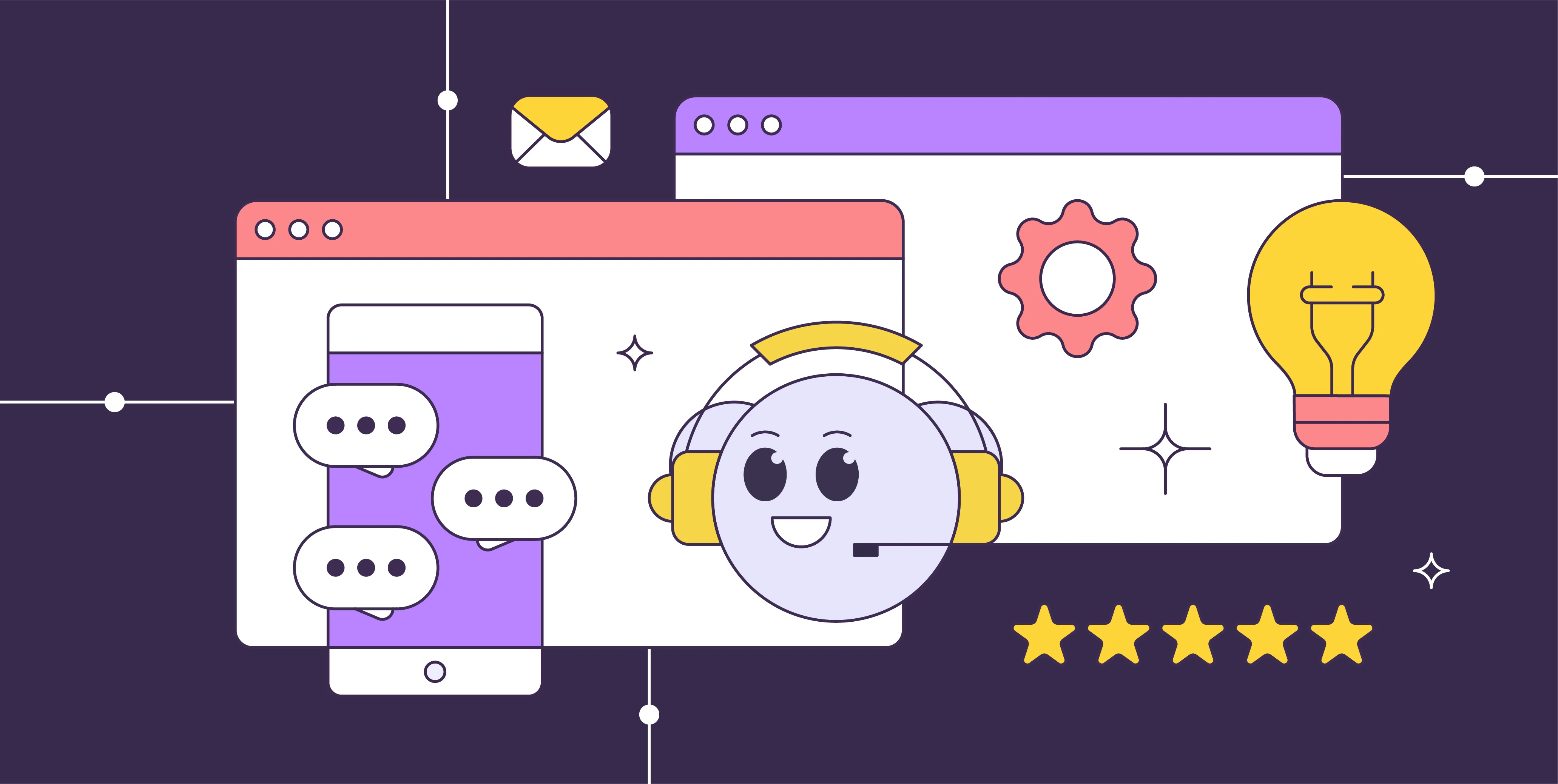تعزيز جمع آراء وملاحظات العملاء باستخدام الذكاء الاصطناعي: دليل التحسينات الاستراتيجية لعام 2024
• Customer Support
• FastBank

"لكل مشروع رئيس واحد فقط: العميل، الذي يمكنه فصل الجميع في الشركة، من رئيس مجلس الإدارة حتى آخر موظف، وذلك من خلال إنفاق أمواله على منتج آخر." تُعد هذه الكلمات بمثابة تذكير واضح من مؤسس Walmart - سام والتون. ففي مجال الأعمال، تكمن السلطة النهائية في أيدي الأشخاص الذين يختارون بوعي دعم العلامة التجارية.
يُعد فهم تعليقات العملاء والتصرف بناءً عليها أمرًا ضروريًا للشركات، فالآراء تساعدك على رسم خظة عمل ترتكز على العملاء.
قد يكون الأمر مرهقًا ويستغرق وقتًا طويلاً بالنسبة للشركات للتنقل في بحر الآراء الواسع. ولكن الخبر السار هو أن عصر التخمين وعدم اليقين قد انتهى، وذلك بفضل ظهور أدوات متقدمة تعمل بالذكاء الاصطناعي والتي تساعد في جمع وتتبع تعليقات العملاء.
في هذه المقالة، سنتعرف على التأثير التحويلي للذكاء الاصطناعي في عملية جمع التعليقات وتحليلها.
الوسائل التقليدية لجمع الملاحظات: القيود والتحديات
لقد عاشت الوسائل التقليدية لجمع الملاحظات، مثل الاستطلاعات والتعليقات والتفاعلات الشخصية، فترات طويلة من الزمن. وعلى الرغم من أن هذه الوسائل قد أدّت دورها، فإنها تأتي مع قيود وتحديات يمكن أن تعيق كفاءة جمع الملاحظات القيّمة من العملاء.
أولاً، تعاني الاستطلاعات غالبًا من معدلات استجابة منخفضة ويمكن أن تسبب إرهاقًا للمشاركين. فالعملاء الذين يتعرضون لعدد كبير من الاستبيانات الطويلة قد يندفعون للإجابة بسرعة أو يتخلون عنها، مما يؤدي إلى تحريف البيانات والمعلومات غير المكتملة. وبالمثل، يمكن بسهولة تجاهل التعليقات التي تُترك في المتاجر أو في نهاية أي خدمة.
أما بالنسبة للتفاعلات الشخصية، فعلى الرغم من أنها قيّمة في بناء العلاقات، إلا أنها محدودة بالقيود الجغرافية وتوافر الوقت. بالإضافة إلى ذلك، قد يؤدي التواصل الشخصي إلى استجابات متحيّزة، حيث قد يتجنب العملاء المواجهة ويترددون في مشاركة الملاحظات السلبية.
دور الذكاء الاصطناعي في جمع الملاحظات والآراء
على عكس الطرق التقليدية التي تعتمد على التحليل اليدوي والتفسير الذاتي، يجلب الذكاء الاصطناعي مرحلة جديدة من الكفاءة والدقة للعملية.
إحدى الأدوار الأكثر أهمية للذكاء الاصطناعي في جمع التعليقات هي قدرته على توفير رؤى فورية حول العملاء. من خلال أدوات التعليقات المدعومة بالذكاء الاصطناعي، يمكن للشركات الوصول إلى التعليقات المحدّثة باستمرار من مختلف القنوات، بما في ذلك وسائل التواصل الاجتماعي، والآراء عبر الإنترنت، واستطلاعات العملاء. هذه الفورية تتيح للشركات أن تكون مرنة وسريعة الاستجابة، وأن تتعامل مع المشكلات فور ظهورها.
الفوائد وحالات الاستخدام
التحليلات التنبؤية المتقدمة: باستخدام الأدوات الخاصة بتعليقات العملاء، يمكن للشركات الحصول على رؤى استباقية حول السلوكيات الناشئة. من خلال تحليل مجموعات البيانات الشاملة، تبقى الشركات مرنة في توقع ديناميكيات السوق. يعزز هذا النهج التكيف المستمر والابتكار، مما يضع الشركات في موقع متميز لتحقيق ميزة تنافسية مستدامة.
معالجة البيانات وتحليلها في الوقت الفعلي: من خلال تحليل البيانات فور توليدها، يمكن للشركات الاستجابة بسرعة لاستفسارات ومخاوف العملاء. إن المرونة في معالجة البيانات وتحليلها في الوقت الفعلي تُمكّن الشركات من تعديل استراتيجياتها والاستجابة دون تأخير.
عملية ربط رحلة العميل: من خلال تحليل آراء العملاء باستخدام الذكاء الاصطناعي، يمكن للشركات إنشاء خطة مفصّلة لتجربة العميل. عن طريق فحص بيانات التعليقات في كل نقطة اتصال، تحصل الشركات على رؤى حول مشاعر العملاء وتفضيلاتهم والمشاكل التي يواجهونها طوال رحلتهم.
فرص الاستهداف الدقيق: إن جمع ملاحظات العملاء باستخدام أدوات الذكاء الاصطناعي يفتح العديد من فرص الاستهداف الدقيق للشركات. بهذه الطريقة، يمكن للشركات تقسيم جمهورها إلى مجموعات مستهدفة بدقة بناءً على معايير محددة مثل الديموغرافيا وسجل الشراء والمزيد. الخطوة التالية هي تقديم رسائل وعروض وتجارب مخصصة لكل شريحة من الجمهور، مما يزيد من الملاءمة والتفاعل.
من النظرية إلى التطبيق: دمج الذكاء الاصطناعي في عملية جمع التعليقات
إن دمج الذكاء الاصطناعي في عملية جمع التعليقات يُعَدّ خطوة حاسمة للشركات التي تسعى لتعزيز فهمها لاحتياجات العملاء.
الأدوات الأكثر تقدممًا لجمع تعليقات العملاء
في ما يلي أفضل ثلاث أدوات لجمع تعليقات العملاء التي أثبتت قيمتها في تحقيق استجابة سريعة وزيادة رضا العملاء:
Hoory AI: وهي أداة متقدمة لأتمتة عملية دعم العملاء، فهي مُزودة بأحدث تقنيات AI مثل الذكاء الاصطناعي الحواري ومعالجة اللغة الطبيعية والتعلم الآلي. تقوم Hoory AI بجمع تعليقات العملاء وتقييم أداء الوكلاء وتحدّد الأقسام التي تحتاج إلى تطوير في تجربة العملاء. بالإضافة إلى جمع التعليقات، يمكنك استخدام القوالب الجاهزة لتوليد وتقييم العملاء المحتملين، والاستبيانات، وتوصيات المنتجات، والمزيد. تضمن Hoory AI دعم عملاء خالٍ من الأخطاء على مدار الساعة، وهي مجهزة بحزمة مدهشة من الميزات والوظائف، بما في ذلك صناديق البريد متعددة القنوات، نوعين من مساعدي الذكاء الاصطناعي - القائم على المعرفة والقائم على القواعد، ودعم متعدد اللغات للنصوص والمقاطع الصوتية، والتقارير المتقدمة، وغير ذلك الكثير.
Glide AI: تسهل عملية جمع تعليقات العملاء من خلال مجموعة من الميزات مثل تقديم موجز للتعليقات وتحليل المشاعر. تقوم هذه الأداة أيضًا بتصنيف التعليقات إلى مشاعر إيجابية وسلبية ومحايدة، كما أنها تقوم بتحديد العناصر التي تتطلب اتخاذ إجراءات فورية لمعالجة استفسارات العملاء المستعجلة بفعالية.
Userlytics: هي أداة متعددة الاستخدامات لجمع تعليقات العملاء، كما أنها مصممة لتقديم رؤى قيمة حول سلوك المستخدمين. تقدم Userlytics مجموعة شاملة من أدوات الاختبار والتحليل لتلبية الاحتياجات المتنوعة للأعمال، حيث يمكنها إجراء جلسات اختبار عن بُعد، وجمع التعليقات في الوقت الفعلي، وتحليل تجارب المستخدمين لتحسين مواد العرض الرقمية بشكل فعّال.
بدءًا من الاختبارات المُدارة وغير المُدارة وصولًا إلى اختبار النماذج الأولية والاختبارات الموجهة لتحسين الوصول، تساعد هذه الأداة في تقييم تجارب المستخدمين عبر مختلف المنصات الرقمية.
بالإضافة إلى ذلك، توفر المنصة وظائف تحليل تجربة المستخدم باستخدام الذكاء الاصطناعي، مما يمكن الشركات من استخلاص رؤى ذات مغزى وتحسين استراتيجياتها وفقًا لذلك.
في الختام
يمثل دمج الذكاء الاصطناعي في جمع آراء العملاء خطوة كبيرة إلى الأمام للشركات التي تسعى للحصول على رؤى أعمق في تفضيلات وسلوكيات العملاء.
من خلال خوارزميات الذكاء الاصطناعي القوية، يمكن للشركات التعامل مع كميات هائلة من بيانات الآراء والتعليقات، واكتشاف رؤى دقيقة وأنماط قابلة للتنفيذ.
بمعنى آخر، يمكّن الذكاء الاصطناعي الشركات من تلبية وتجاوز توقعات العملاء، من تحسين عروض المنتجات إلى تحسين عمليات دعم العملاء.

























